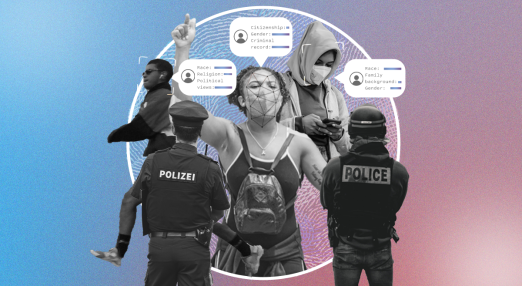Blogs
Filter by...
-

The EU’s Artificial Intelligence Act: Civil society amendments
Artificial Intelligence (AI) systems are increasingly used in all areas of public life. It is vital that the AI Act addresses the structural, societal, political and economic impacts of the use of AI, is future-proof, and prioritises affected people, the protection of fundamental rights and democratic values. The following issue papers detail the amendments of civil society following the Civil Society Statement on the AI Act, released in November 2021.
Read more
-

Europol’s new powers will enable Big Data analysis and mass surveillance. We say NO!
The European Parliament is soon to vote on the new Europol reform which aims to expand the law enforcement agency’s powers without any accountability and with as few fundamental rights safeguards as possible. To influence the vote, EDRi has mobilised civil society organisations in a joint advocacy action of reaching out directly to members of the European Parliament to urge them to vote against the proposal.
Read more
-

EU negotiators approve good DSA, but more work is needed to build a better internet
Friday night’s political agreement on the Digital Services Act (DSA) is a good first step towards protecting people’s rights on the internet and to some extent limiting the immense power that Big Tech companies have over people and democracies.
Read more
-

Internal documents revealed the worst for private communications in the EU; how will the Commissioners respond?
EDRi, Europe's biggest network for rights and freedoms across Europe and beyond, urge the European Commission to not put forward a CSAM proposal that would undermine the CJEU prohibition of general monitoring or subject Europeans to monitoring that would turn their devices into spyware.
Read more
-

The European Parliament must go further to empower people in the AI act
Today, 21 April, POLITICO Europe published a leak of the much-anticipated draft report on the Artificial Intelligence (AI) Act proposal. The draft report has taken important steps towards a more people-focused approach, but it has failed to introduce crucial red lines and safeguards on the uses of AI, including ‘place-based’ predictive policing systems, remote biometric identification, emotion recognition, discriminatory or manipulative biometric categorisation, and uses of AI undermining the right to asylum.
Read more
-

Member in the Spotlight: Asociația pentru Tehnologie și Internet – ApTI (Association for Technology and Internet)
ApTI is a non-governmental organisation that aims to support and promote a free and open Internet where human rights are guaranteed and protected. A free Internet represents an environment where privacy and freedom of expression are respected, while an open Internet represents a guarantee for secure and rightful access to the benefits brought by information technology.
Read more
-

Policing: France proposes massive EU-wide DNA sweep, automated exchange of facial images
The French Presidency of the Council is seeking EU-wide comparisons of every DNA profile held by police forces against all those held by other national police forces, as well as EU policing agency Europol, as part of plans to upgrade the ‘Prüm’ network of police databases. It also hopes to automate the police exchange of facial images by eliminating requirements for human review.
Read more
-

EDRi-gram, 20 April 2022
In this edition of the EDRi-gram, we look at how you can influence the AI Act in order to ban biometric mass surveillance across Europe. We also raise our concerns with the new Cybercrime Protocol which threatens to undermine our privacy to compensate for the rising powers of law enforcement authorities. Don't miss out to learn who the biggest data sinners of the last year are, join the German Big Brother Awards 2022. In previous years, the Big Brother Awards have placed a spotlight on threats to privacy and basic rights, including loyalty cards, credit scoring, toll cameras, colour photocopiers or mobile phone surveillance.
Read more
-

UK High Court rules blanket seizure of asylum seekers’ phones breached Article 8 ECHR
On 25 March 2022, the UK High Court ruled that the Home Office acted unlawfully and breached human rights and data protection laws by operating a secret, blanket policy of seizing, retaining and extracting data from the mobile phones of asylum seekers arriving by small boat to UK shores between April and November 2020.
Read more
-

CNIL orders three controllers to comply with GDPR after decision that using Google Analytics is illegal
Only weeks after the groundbreaking decision by the Austrian Data Protection Authority that the continuous use of Google Analytics violates the GDPR, the French Data Protection Authority (CNIL) ordered three French websites to comply with the GDPR. All these decisions are based on noyb's 101 model complaints which were filed after the Court of Justice ruling invalidating Privacy Shield. noyb expects similar decisions by the other authorities.
Read more
-

How can you influence the AI Act in order to ban biometric mass surveillance across Europe?
The EU is currently negotiating the Artificial Intelligence (AI) Act. This future law offers the chance to effectively ban biometric mass surveillance. This article aims to offer an overview of how the EU negotiates its laws and the key AI Act moments in which people can make their voices heard.
Read more
-

Europol’s reform: A future data black hole in European policing
The European Parliament is soon due to vote on the powers expansion of the European Union’s law enforcement agency, Europol. Civil society has been extremely critical of Europol’s mandate revision, raising many concerns with regards to the lack of fundamental rights protections and policymakers’ blind and absolute trust in how the agency will use its new powers. All the more reasons to be worried: the result of the trilogue negotiations with the Council of the EU made it even worse.
Read more
